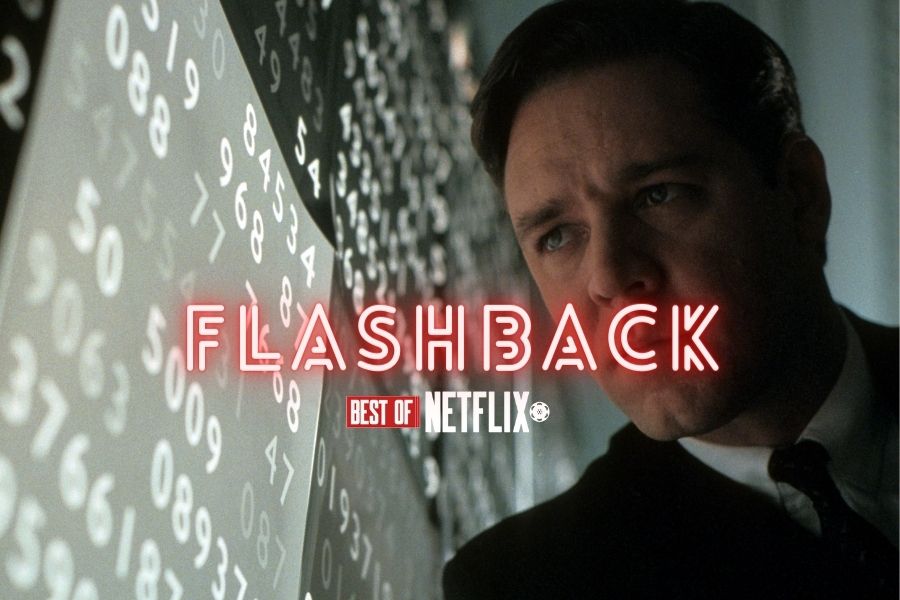Using Netflix Flashback to shine a light on some of the hidden gems on the electronic shelves of Netflix is one of our favourite pastimes. Now, we’re highlighting one of the best films made in recent years, starring Russell Crowe in arguably his best role. It’s A Beautiful Mind.
Ron Howard’s 2001 cinematic ode to American mathematician John Nash has been canonised by many people as one of the better biopics in recent history, citing it as an emotional as well as an inspiring story of a pioneer who finally gained recognition. Given that many have criticised the project for not acknowledging Nash’s alleged anti-semitic past and for glorifying mental illness by presenting a tortured genius does, two decades after its release, the Academy Award-winning film still retain its initial lustre or have viewers started to see through the reductive melodrama?
Russell Crowe‘s phenomenal acting as Nash is probably one of the primary reasons why the film is idolised but is it enough to redeem A Beautiful Mind’s flawed representation of mathematics and its fetishisation of genius? The film has indeed influenced many other “genius flicks” over the years, movies such as The Imitation Game, The Theory of Everything and The Man Who Knew Infinity and more, solidifying how popular culture views some of the brightest minds in human history, portraying them as nerdy Neos from The Matrix who can see numbers floating in the air but do not have the athletic prowess to dodge bullets in slow-motion. I am assuming they figured they had to draw the line somewhere. A Beautiful Mind is guilty of the same, and I can understand why. Cinema is a visual medium, and the visual narrative has to complement the emotionally manipulative subtext of the film.
Although Howard and the writers maintained that A Beautiful Mind was never intended to be an exact rendition of Nash’s life, some of the dramatised moments feel like the recurring schizophrenic hallucinations in the film. Most of the pivotal moments in the film never happened: the imaginary people Nash kept seeing (he only heard voices at first), the pen-ceremony at Princeton or even the famous Nobel Prize acceptance speech.
The film excels at creating an atmospheric paranoia, externalising Nash’s conflicted state of mind as he decodes random words from magazines and runs from shady secret agents driving black cars, which become a symbol of mortality and death. However, it never delves beneath the surface and is content with presenting a binary view of reality and fantasy after the “big reveal”. Unlike more nuanced investigations of the troubled genius archetype like Darren Aronofsky’s brilliant 1998 film Pi, A Beautiful Mind never attempts to have a discourse on the philosophical implications of Nash’s discoveries. It focuses on his personal life and reduces the gravity of his scholarly work by stating that he came up with a revolutionary economic theory while gawking at a blonde in a bar and figuring out the optimal way to get laid.
Even if the makers of A Beautiful Mind claim that the film explores Nash’s complicated marriage with Alicia (played by Jennifer Connelly), it does not hold up because it chooses a simplistic portrayal of a devoted wife who stands by her ill husband. In reality, Alicia divorced Nash in 1963 (remarrying in 2001), and Nash himself had a child with another woman. According to Nash’s biographer Sylvia Nasar, he “wished to show everyone that he was the master of this gorgeous young woman, and that she was his slave” and attempted to prove the same by putting his foot on her neck after throwing her to the ground during a picnic.
In retrospect, it is a difficult task to categorise A Beautiful Mind as a biographical film when its drama overwhelms the facts, and the drama itself is more blatant than it is artistic. Despite the film’s glamorous insistence that Nash walked into the Pentagon and foiled Soviet schemes while scanning arbitrary numbers on a high-tech screen (for that time), he only worked on defence issues with a non-profit think tank called the Rand Corporation.
The Nobel Prize acceptance speech is the apotheosis of the film’s commitment to the spectacle: making Crowe deliver a monologue about reason, metaphysics and love while the real Nash, in actual fact, never even gave an acceptance speech. It taps into society’s rampant fetishisation of gifted minds without questioning the mechanisms behind it. That acceptance speech is just as real as the parodied one in Charlie Kaufman’s latest film, I’m Thinking of Ending Things, where he does not make a genius utter the same lofty words but a common man, a nobody with delusions of grandeur. Kaufman brilliantly subverts the spectacle by raising questions that Howard and his team never bothered themselves with, never moving beyond the sentimental aspects of the narrative.
A Beautiful Mind is seen as a definitive work of the genre, but it neither presents a complete picture like Spike Lee’s Malcolm X nor is it aware of its own limitations. It masquerades didactic fiction as important truths, hoping the audience will settle for the hollow dramatic flourishes.
Watch A Beautiful Mind on Netflix.
